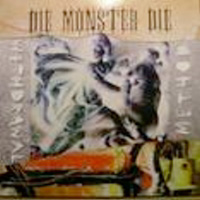 Black Dogs
Black Dogs
by Ian McEwan (Bantam Trade Paperback)
by Stephen Thomas
Most of us are fascinated by violence and death. Some people admit it, but the great majority of us don’t. When things get really grisly, we say that a movie or a book overdoes it, is too violent, too macabre, “too nasty.”
And yet violence gives us that thrill, that beautiful shock. Let’s admit it. We read the passage again. We rewind. We explore it, and best of all, in a work of art, we have control.
There are plenty of books that play on our appetite for violence. But there are not nearly as many that explore where that appetite comes from, and how close it is to passion, political conviction, and even love. Ian McEwan’s Black Dogs is one book that explores the philosophical and historical territory of violence.
By the way, if you’re looking for arterial spray and flying limbs, look elsewhere. This is a book of ideas, and much more rewarding as such. How many minutes is a Brett Easton Ellis book going to stay in your head after you’ve finished reading it? Less than zero, is my guess. Black Dogs has been kicking around in my head for a couple of weeks.
The book’s protagonist is an English man named Jeremy, who lost both parents to a car accident. Growing up without parents makes him a relativist. “I had no attachments, I believed in nothing. It’s not that I was a doubter…. There was simply no good cause, no enduring principle, no fundamental idea with which I could identify.”
He spends his life searching for parent figures. First he is fascinated with the parents of his friends, and when he marries, he becomes intensely interested in his separated parents-in-law, Bernard and June Tremaine. The inlaws, two former communists, are divorced, the rift between them growing out of one event – the woman’s encounter with two black Gestapo guard dogs in the French Countryside.
The protagonist is fascinated by his mother-in-law’s descriptions of the event. June Tremaine says that she has seen evil in the Black Dogs, and having faced it, has been set free. She says to Jeremy: “Wait until you come to make sense of your life. You’ll either find you’re too old and lazy to make the attempt, or you’ll do what I’ve done, single out a certain event, find in something ordinary and explicable a means of expressing what might otherwise be lost to you… I haven’t mythologized these animals. I’ve made use of them. They set me free.”
Her husband, now a British labor party politician, thinks the encounter is hogwash. He is a rationalist, a man of ideas, and analyst of the big political picture. He is not into soul revelation.
The protagonist becomes so fascinated with his parents-in-law that he decides to write a book about them. He explores their divergent memories of the same events, not unlike the way many young people, armed with the relativistic attitude of the late 20th century, might look back at the first half of the century, at the World Wars and the “universal reference point of human depravity”, the holocaust of Nazi Germany. The protagonist is not sure which parent to believe, and what lesson to extract from the differing histories.
McEwan is a masterful plotter. The book skips nimbly through times and places, and the prose is layered and elegant, without being pretentiously wordy.
Throughout the book, McEwan’s intricate juxtapositions of character and event show that violence and love, cruelty and compassion, are heads and tails of a coin. The protagonist first makes love to his wife after they have travelled through the remains of a concentration camp. He later defends a young boy being beaten by his father, and then takes pleasure making that father suffer pain.
By the end of the book, both parents-in-law have passed away, and their voices inhabit the protagonist. His quest to write the book parallels a culture’s need to re-explore the past in order to understand its present. And while the book makes many references to Nazi Germany, I wouldn’t write it off as a simple cautionary tale on the need to remember (although in a few places McEwan gets dangerously close to punch-line symbolism). It is the story of three very different characters; and of one man’s search through memory, which, for all its imperfections and even outright lies, is the only guide we have to inform our conduct and lead us to self-knowledge.

